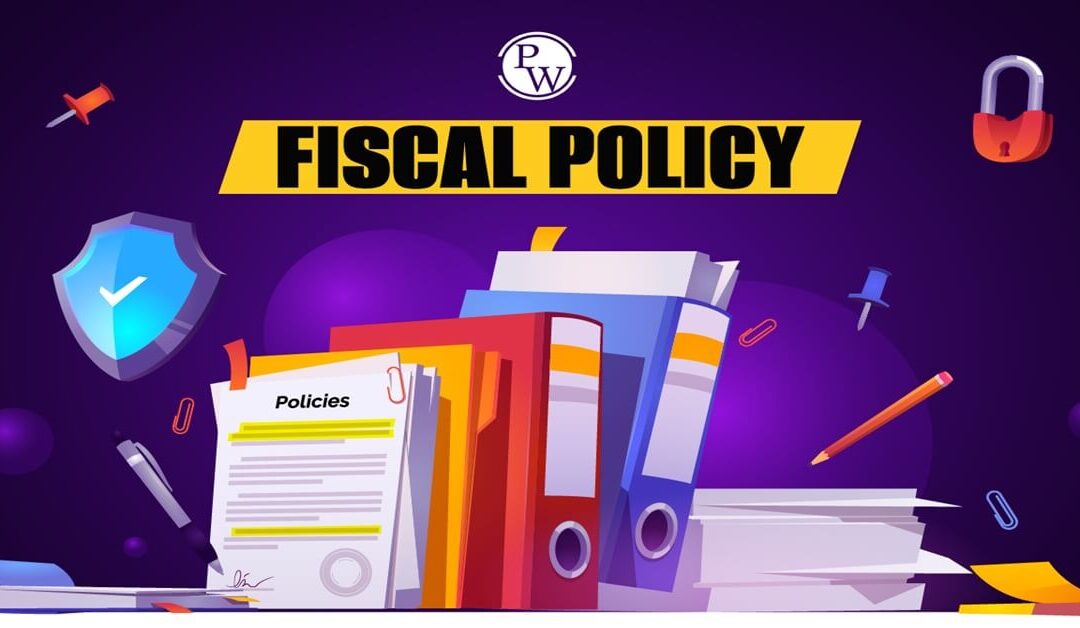
Fiscal Policy: Objectives and Importance
What is Fiscal Policy?
Fiscal policy is a crucial tool used by governments to manage the economy. It refers to the use of government spending and taxation to influence a nation’s macroeconomic conditions, including employment, inflation, aggregate demand for goods and services, and economic growth.
The government evaluates how much revenue it collects through taxes and how it allocates this income across sectors like defense, welfare, and education. Fiscal policy works hand-in-hand with monetary policy (regulated by central banks) to balance the economy. While monetary policy manages the supply of money and credit, fiscal policy directly impacts economic growth and income redistribution.
Objectives of Fiscal Policy
Governments adopt fiscal policies with specific objectives to ensure economic stability and development. Let’s explore the five primary goals:
1.Economic Growth
Governments aim to stimulate economic activity by encouraging investments and consumption. However, an aggressive fiscal approach can sometimes lead to long-term economic instability.
2.Full Employment
Achieving full employment is a critical goal. Governments invest in infrastructure projects and reduce taxes to create jobs and provide more money for consumer spending, indirectly driving employment growth.
3.Debt Control
A controlled fiscal deficit is necessary to prevent excessive national debt. Rational fiscal policies focus on balancing revenue generation and expenditure to ensure long-term economic sustainability.
4.Income Redistribution
Fiscal policies aim to bridge the wealth gap between the rich and the poor. Progressive taxation and social welfare programs redistribute wealth to promote equity, though excessive taxation can sometimes lead to tax evasion.
5.Inflation Control
During periods of strong economic growth, inflation can rise. Governments implement fiscal measures like increasing taxes to reduce disposable income and curb excessive spending, thus controlling inflation.
Fiscal Policy in India
India’s fiscal policy focuses on leveraging taxation and public spending to promote economic stability and growth. This approach complements monetary policy to achieve macroeconomic objectives.
Key Objectives of India’s Fiscal Policy
1.Economic Growth
Encourages investment and consumption through targeted spending on sectors like infrastructure, healthcare, and education.
2.Price Stability
Controls inflation to maintain a stable economic environment.
3.Full Employment
Promotes job creation through public projects and development programs.
4.Equitable Income Distribution
Implements progressive taxes and welfare schemes to ensure resource equity and social justice.
5.External Stability
Balances trade and payments through tariffs, subsidies, and exchange rate adjustments.
6.Resource Mobilization
Optimizes revenue generation while keeping the fiscal deficit manageable.
7.Infrastructure Development
Allocates resources to critical infrastructure projects like transportation, energy, and communication to ensure long-term economic progress.
8.Social Welfare
Invests in programs targeting poverty alleviation, education, healthcare, and social security to uplift marginalized communities.
9.Environmental Sustainability
Focuses on promoting sustainable development through green policies, ensuring economic growth aligns with ecological preservation.
The Role of Fiscal Policy in a Nation’s Progress
Fiscal policy plays a pivotal role in shaping a country’s economic landscape. By addressing employment, inflation, and growth challenges, it creates a stable and progressive environment. In India, the government’s fiscal measures focus on equitable resource distribution, sustainable development, and infrastructure expansion, ensuring a balanced approach to long-term prosperity.
The Importance of Fiscal Policy in Economic Development
Fiscal policy is one of the most significant tools used by governments to regulate and stabilize an economy. By adjusting public spending and taxation, fiscal policy influences macroeconomic factors like growth, employment, inflation, and income distribution. Here’s a detailed look at why fiscal policy is crucial:
1. Promotes Economic Growth
Fiscal policy drives economic growth by allocating resources to critical areas such as infrastructure, education, and healthcare. Public spending stimulates demand, encourages private investment, and creates a multiplier effect that boosts overall economic activity.
2. Controls Inflation and Deflation
Fiscal policy helps maintain price stability in an economy. During periods of inflation, governments can reduce spending or increase taxes to curb excessive demand. Conversely, during deflation, expansionary fiscal measures like tax cuts and increased spending inject liquidity into the economy, stimulating demand and production.
3. Achieves Full Employment
Unemployment poses significant challenges to any economy. Through fiscal policy, governments create job opportunities by investing in infrastructure projects and public programs. Reduced taxes during economic downturns can also encourage businesses to expand, creating additional employment.
4. Reduces Income Inequality
One of the essential roles of fiscal policy is to promote equity in income distribution. Progressive taxation ensures the wealthy contribute more, while welfare schemes provide support to the underprivileged. This redistribution of resources helps bridge the economic divide and fosters social stability.
5. Ensures Public Welfare
Fiscal policy enables governments to address the needs of marginalized communities by funding social programs in healthcare, education, and housing. These initiatives improve living standards, enhance productivity, and contribute to long-term development.
6. Balances Trade and External Stability
By adjusting tariffs, subsidies, and taxes, fiscal policy helps regulate a country’s trade balance. It ensures sustainable external payments and exchange rate stability, which are vital for global competitiveness and economic resilience.
7. Manages Public Debt
Prudent fiscal policy helps governments manage their debt effectively. By controlling deficits and ensuring optimal resource allocation, fiscal measures reduce the risk of unsustainable debt levels, ensuring economic stability.
8. Stimulates Private Sector Participation
Public spending on infrastructure and other essential services creates an environment conducive to private investment. Fiscal policy encourages businesses to participate in economic development, fostering innovation and entrepreneurship.
9. Supports Sustainable Development
Modern fiscal policies incorporate environmental considerations. Governments invest in green technologies and sustainable projects, ensuring economic growth aligns with ecological preservation and long-term sustainability.
Conclusion
Fiscal policy is a powerful instrument for achieving economic stability and growth. It plays a pivotal role in steering an economy toward development, addressing unemployment, controlling inflation, and ensuring equitable distribution of resources. By fostering both short-term stability and long-term progress, fiscal policy remains central to a nation’s prosperity and resilience.
